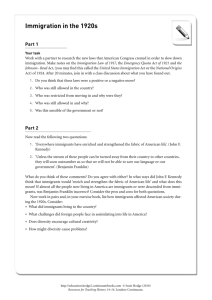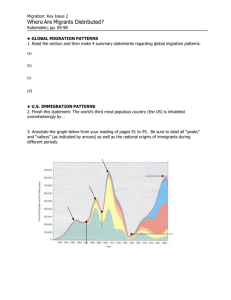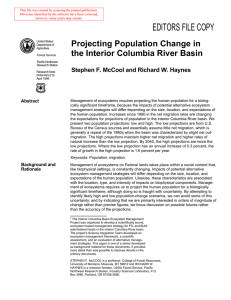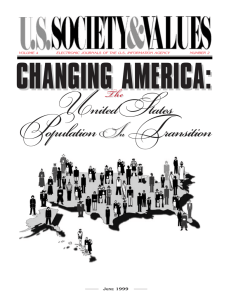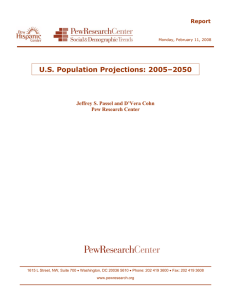Census Bureau has historically underpredicted Population Growth
advertisement
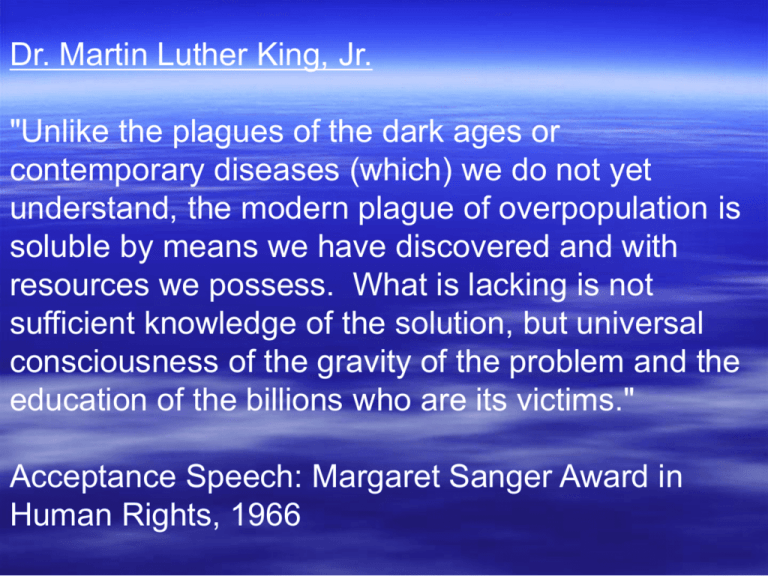
Dr. Martin Luther King, Jr. "Unlike the plagues of the dark ages or contemporary diseases (which) we do not yet understand, the modern plague of overpopulation is soluble by means we have discovered and with resources we possess. What is lacking is not sufficient knowledge of the solution, but universal consciousness of the gravity of the problem and the education of the billions who are its victims." Acceptance Speech: Margaret Sanger Award in Human Rights, 1966 World Population Growth Through History Billions 12 11 2100 10 9 8 Old Stone 7 Age New Stone Age Bronze Age Iron Age 6 Modern Age Middle Ages 2000 Future 5 4 1975 3 1950 2 1 Black Death—The Plague 1900 1800 1+ million 7000 6000 5000 4000 3000 2000 1000 A.D. A.D. A.D. A.D. A.D. A.D. years B.C. B.C. B.C. B.C. B.C. B.C. B.C. 1 1000 2000 3000 4000 5000 Source: Population Reference Bureau; and United Nations, World Population Projections to 2100 (1998). • World Now Adding 80 Census Bureau has historically MillionPopulation People/Yr underpredicted Growth – or will this decline be because of environmental meltdown? Population Growth Rates by Country • Low Growth Rates ― Austria (0.09%), Czech Rep. (-0.06%), Croatia (-0.03%), Japan (0.02%), the EU (0.15%), Former Soviet Blocs (neg.), Botswana (-0.04%) • High Growth Rates ― Burundi (3.7%), Congo (3.0%), Mali (2.63%), Afghanistan (2.7%), Angola (2.5%), Saudia Arabia (2.2%), Syria (2.3%) • Lower Growth Rates but Large Populations ― China (0.6%), India (1.4%), U.S. (1.2%), Indonesia (1.4%), Brazil (1.0%), Bangladesh (2.1%), Pakistan (2.1%), Russia (-0.37%), Nigeria (2.4%), Japan (0.02%) Exponential Growth Doubling time(yrs) = 70/P P = %growth per year For India, P =1.4% So, at present rate of pop increase, India’s pop will grow from 1 to 2 billion by 2050. (The total world pop in 1950 was 2.5 billion.) During the 1990s, every one of the 50 states increased in population, the first time this has ever happened In total, 33 million people were added to the USA, the largest ever decadal increase U.S. Population Growth: Outstripping Census Estimates • Based on the 1990 Census and their yearly estimates, the U.S. Census Bureau predicted an increase from 249 to 275 million Residents by the Year 2000. They were “only” off by 7 million people, as 282 million were counted. • This gave us a growth rate of more than 13% for the decade (1.25%/yr), above the world average and the highest growth rate of any developed nation. • This puts us close to the “High” Scenario for U.S. Population Projections for the Rest of this Century (next page) • Immigration is now responsible for 70% of U.S. Population Growth (this includes U.S. born children of immigrants) Census Bureau Projections for U.S. Population High Migration Rates Currently Have Us Near the “High” Line U.S. Population Projections: Low, No Migration, Middle, and High 1200 U.S. Population (millions) • High 1000 800 600 Middle with migration 400 Middle w/o migration 200 Low 0 1990 Source: U.S. Census Bureau, Nat Pop Proj, 1999 2010 2030 2050 Year 2070 2090 Public Policy Institute of California: ***************************** Fall 2004 survey of 2500 California Adults in English, Spanish, Chinese, Korean, Vietnamese What about traffic congestion on freeways and major roads? Big problem: 59% Somewhat of a problem: 26% How about population growth and development? Big problem: 35% Somewhat of a problem: 33% Availability of housing that you can afford? Big problem: 55% Somewhat of a problem: 23% A zillion lists have popped up recently advising us how to conserve energy & resources But traffic, congestion, and affordable housing issues are not going to get any better even if everyone switches to driving a Toyota Prius instead of an SUV -- the freeways will be just as crowded A very short quiz on: just how crowded is California?? Question 1: what was the #1 county in the entire USA in the late 1940s in terms of $ value of agricultural production? Question 2: Which is more densely populated (has more people per square mile): California or Europe? Cali forni a Pop ulation Gro wth 18 50-20 00 40 ,000 ,000 30 ,000 ,000 20 ,000 ,000 10 ,000 ,000 0 18 50 18 60 18 70 18 80 18 90 19 00 19 10 19 20 19 30 19 40 19 50 19 60 19 70 19 80 19 90 20 00 Ye ar California Popu lati on Pro jection s 20 00-20 50 60,000,000 50,000,000 40,000,000 30,000,000 200 0 201 0 202 0 203 0 204 0 205 0 Yea r “These population projections depict only one possible course of future population change, i.e., the one reflecting recent trends in fertility, mortality, and migration. These projections do not necessarily show what is most desirable but rather what can be reasonably expected if current trends continue until the year 2050.” -- California Department of Finance, Demographic Research Unit, 2004. (emphasis added) Some effects of population growth: Traffic—California contains 5 of the top 12 U.S. cities with worst travel mobility (annual delay per traveler) #1 Los Angeles/Long Beach/Santa Ana #2 San Francisco/Oakland #9 Riverside #11 San Jose #12 San Diego Air Pollution—37 of California’s 58 counties are in Non-Attainment Status for regulated air pollutants. Farmland Loss—farmland is being converted to urban development at the rate of 50,000 acres per year. Rare and Threatened Species California rank among the states i. First in biodiversity (6,717 species) ii. First in endemic species (1,295) iii. Second in percentage of species at risk (28.5%) iv. Third in extinct species (53) Table 1. Human-caused reductions in westside California plant communities and formations (after Noss and Peters 1995). “Habitat loss due to population growth presents the single greatest problem facing native plants and animals in California.” --California Department of Fish and Game, Atlas of the Biodiversity of California, 2003. A CAPS study shows that, in recent decades, more than 90% of California’s population increase is due to immigrants and their U.S. born children Inconvenient Truths • The US is the largest contributor of any country to greenhouse gases (although, unfortunately, China will be overtaking us pretty soon). • “An Inconvenient Truth” Website – Take Action greenhouse gas, is responsible more than any other country for : Fluorescent light bulbs, thermostats, HVAC filters, EnergyStar appliances, water heaters, hot water, clotheslines, vampire electronics, recycle, plant a tree, insulate home, carpool, check your tires, fly less. – these are all good ideas. Inexplicably, having two children or less is not on the list! • Per capita CO2 emissions track population growth remarkably well, so doing all of the above will not make a significant impact in our global warming problem -- unless we also stabilize our population To slow U.S. growth: Approximately 2/3 of U.S. growth is a result of immigration (1.6 million immigrants + 800,000 births to immigrants out of annual growth of 3.3 million), therefore reducing immigration is the single most effective policy to slow U.S. growth. To slow California growth: Over 90% of California growth is a result of immigration (250,000 immigrants +250,000 births to immigrants out of annual growth of 550,000), therefore reducing immigration is the single most effective policy choice to slow California growth. Senator Gaylord Nelson, Founder of Earthday: “In this country it’s phony to say ‘I’m for the environment’, but not for limiting immigration.” China & the USA: the biosphere’s worst enemies Converging together to the same destructive destiny China started with a big population and a low per capita environmental impact, that is now rapidly increasing. The USA started with a big per capita impact and a small population, that, due to massive immigration, is now rapidly increasing. Mao Zedong: “Every mouth is born with two hands attached” A very widespread, present policy, debate in the USA: “Do immigrants add more to society than they cost society?” ************************************************* The two quotations are, for all practical purposes, operationally equivalent: their focus is short-term and, for China, demonstrably disastrous in the long term. The great environmental economist, Prof. Herman Daly warned: We are treating the planet as if it were a business in liquidation. BZ’s personal “favorite” example is the overfishing and trashing of the oceans, the dynamiting of coral reefs, etc. The late Jacques Cousteau: “The oceans are dying” Dr. Martin Luther King, Jr. "Unlike the plagues of the dark ages or contemporary diseases (which) we do not yet understand, the modern plague of overpopulation is soluble by means we have discovered and with resources we possess. What is lacking is not sufficient knowledge of the solution, but universal consciousness of the gravity of the problem and the education of the billions who are its victims." Acceptance Speech: Margaret Sanger Award in Human Rights, 1966 Albert Einstein: Those who have the privilege to know, have the duty to act Lists of things people can do to mitigate global warming, but that completely ignore overpopulation: Sierra Club Audubon Society Al Gore’s list NRDC Union of Concerned Scientists Environmental Defense Outside Magazine’s Green Issue Time’s Global Warming Survival Guide Calif. Gov. Ronald Reagan (1974) “Our country and state have a special obligation to work toward stabilization of our own population so as to credibly lead other parts of the world toward population stabilization.” President Dwight D. Eisenhower: “Whatever America hopes to bring to pass in the world must first come to pass in the heart of America.” • CO2 emissions have been tracking population growth for decades. • Biofuels can’t do much for a country experiencing rapid population growth. (2006 U of Minnesota study shows that all of our corn and soybeans would supply 12 and 6% of our gasoline and diesel oil, respectively. U.S. population growth would completely negate that in less than 10 years.) • California’s alternative fuels plan (Jan 2007) calls for a 25% reduction in CO2 emissions (to 1990 levels) by 2020 – all while CA population is projected to grow by 48% from 1990 levels -- with virtually 100% of that due to immigration. California Total Energy Use vs Population (1960-2003) 9,000.0 8,000.0 Trillion BTUs 7,000.0 6,000.0 5,000.0 y = 0.0002x + 1109.2 2 R = 0.8805 4,000.0 3,000.0 2,000.0 1,000.0 0.0 15,000,000 20,000,000 25,000,000 30,000,000 Population Coefficient of Determination (R2) = 0.8805. Over 88% of the variability around the straight line is explained by the population variable. 35,000,000 California Greenhouse Gas Emissions vs Population (1990-2002) Million Metric Tons CO2equivalents 510.0 500.0 490.0 480.0 470.0 460.0 y = 1E-05x - 11.158 450.0 2 R = 0.8167 440.0 430.0 420.0 410.0 29,000,000 30,000,000 31,000,000 32,000,000 33,000,000 34,000,000 35,000,000 Population Coefficient of Determination (R2) = 0.8167. Over 81% of the variability around the straight line is explained by the population variable. 36,000,000





